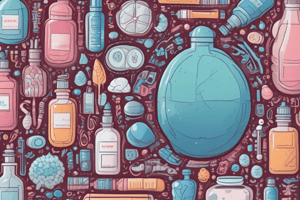Podcast
Questions and Answers
How do alkylating agents combat cancer cells?
How do alkylating agents combat cancer cells?
- By enhancing RNA transcription and promoting cell growth
- By inhibiting protein synthesis and halting cell division
- By interfering with DNA replication and causing cell death (correct)
- By binding to cell receptors and inducing apoptosis
What is the mechanism of action for antimetabolites in combating cancer?
What is the mechanism of action for antimetabolites in combating cancer?
- Acting as antioxidants to protect cells from damage
- Enhancing the immune system response against cancer
- Disrupting DNA synthesis and repair processes (correct)
- Mimicking healthy cells to promote cell growth
What is the primary target of Topoisomerase Inhibitors in cancer cells?
What is the primary target of Topoisomerase Inhibitors in cancer cells?
- Topoisomerases (correct)
- Cell Membrane
- Mitochondria
- Ribosomes
Which chemotherapy drug class alters DNA synthesis in cancer cells?
Which chemotherapy drug class alters DNA synthesis in cancer cells?
Which class of chemotherapy drugs was originally developed as antibiotics?
Which class of chemotherapy drugs was originally developed as antibiotics?
What effect do Alkylating Agents have on cancer cells?
What effect do Alkylating Agents have on cancer cells?
What is the primary mechanism of action of topoisomerase inhibitors in chemotherapy?
What is the primary mechanism of action of topoisomerase inhibitors in chemotherapy?
Which of the following is a targeted therapy agent designed to be more specific to cancer cells?
Which of the following is a targeted therapy agent designed to be more specific to cancer cells?
Immunotherapy drugs work by:
Immunotherapy drugs work by:
Which of the following is an example of a multidrug chemotherapy regimen?
Which of the following is an example of a multidrug chemotherapy regimen?
What is a common side effect of chemotherapy drugs mentioned in the text?
What is a common side effect of chemotherapy drugs mentioned in the text?
How are chemotherapy treatment plans personalized for cancer patients?
How are chemotherapy treatment plans personalized for cancer patients?
Study Notes
Chemotherapy: Fighting Cancer with Drugs
Chemotherapy, commonly known as "chemo," is a powerful, systemic treatment that combats cancer by targeting rapidly dividing cells – a hallmark of malignant growth. The primary weapon in this fight against cancer are chemotherapy drugs. Here, we'll delve into the various classes and features of these life-saving substances.
Alkylating Agents
Alkylating agents work by forming covalent bonds with the DNA of cancer cells, causing breaks in their genetic material. This leads to defects in DNA replication and cell division, ultimately causing cell death or programmed cell death (apoptosis). Examples include:
- Carboplatin
- Cyclophosphamide
- Chlorambucil
- Melphalan
Antimetabolites
These chemotherapy drugs mimic the body's natural building blocks for DNA, RNA, and proteins, but they are altered to disrupt the processes of DNA synthesis and repair. Antimetabolites force cancer cells to incorporate their damaged components, leading to cell death. Examples include:
- Methotrexate
- Cytarabine (also known as Ara-C)
- Fludarabine
- Gemcitabine
Antitumor Antibiotics
Originally developed as antibiotics, these drugs have proven to be effective against cancer cells as well. They include:
- Doxorubicin (Adriamycin)
- Daunorubicin
- Epirubicin
- Dactinomycin (Cosmegen)
Topoisomerase Inhibitors
These drugs work by targeting topoisomerases, enzymes that help unwind DNA during the process of cell division. By binding to these enzymes, topoisomerase inhibitors prevent DNA from unraveling. This causes DNA strands to break and become irreparably tangled, leading to cell death. Examples include:
- Topotecan
- Irinotecan (Camptosar)
- Etoposide
- Bortezomib
Targeted Therapy Agents
These drugs are designed to be more specific to cancer cells, sparing normal cells from damage. Targeted therapies are classified based on the specific molecular abnormalities they target in cancer cells. Examples include:
- BRAF inhibitors (e.g., vemurafenib, dabrafenib)
- EGFR inhibitors (e.g., cetuximab, erlotinib)
- HDAC inhibitors (e.g., vorinostat, romidepsin)
- Angiogenesis inhibitors (e.g., bevacizumab, sunitinib)
Immunotherapy Drugs
These drugs activate or enhance the body's immune system to recognize and attack cancer cells. Some examples include:
- Monoclonal antibodies (e.g., trastuzumab, nivolumab)
- Immune checkpoint inhibitors (e.g., pembrolizumab, ipilimumab)
- Adoptive cell transfer therapies (e.g., CAR T-cell therapy)
Multidrug Regimens
Chemotherapy drugs are often used in combination to maximize the effectiveness of treatment. Some popular regimens include:
- AC (doxorubicin and cyclophosphamide)
- CAF (cyclophosphamide, doxorubicin, and 5-fluorouracil)
- R-CHOP (rituximab, cyclophosphamide, doxorubicin, vincristine, and prednisone)
- TAC (docetaxel, doxorubicin, and prednisone)
Side Effects and Toxicity
Chemotherapy drugs are powerful substances, and they can impact healthy cells and organs, leading to side effects. Common side effects include nausea, vomiting, hair loss, fatigue, and risk of infection. The severity of side effects varies depending on the drug and the individual's response.
Personalized Treatment Plans
Every patient is unique, and chemotherapy treatment plans are tailored to the type of cancer, stage, and individual health factors. Tumor testing and molecular profiling are used to identify the most effective drugs and treatment regimens for each patient.
Conclusion
Chemotherapy drugs have been saving lives and improving the quality of life for cancer patients for decades. Through ongoing research and development, new drugs, and treatment approaches are being discovered to help patients fight cancer with greater precision and efficacy. Understanding the diverse classes of chemotherapy drugs and their potential side effects helps patients make informed decisions about their treatment options and empower them to work with their healthcare team to achieve the best possible outcomes.
Studying That Suits You
Use AI to generate personalized quizzes and flashcards to suit your learning preferences.
Description
Explore the various classes of chemotherapy drugs, such as alkylating agents, antimetabolites, antitumor antibiotics, topoisomerase inhibitors, targeted therapy agents, immunotherapy drugs, and multidrug regimens. Learn about how these drugs work to combat cancer, their side effects, and the importance of personalized treatment plans.



